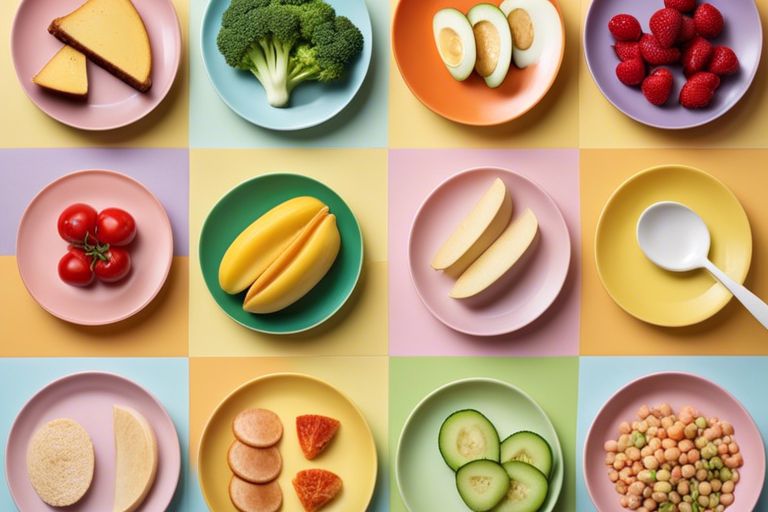tips, tricks and guides for parenthood
The journey of introducing solid foods to infants is a crucial phase in their development. Proper nutrition during this time is important for their growth and overall well-being. It's important to create a balanced meal plan that includes a variety of nutrient-rich foods to meet their changing nutritional needs. By offering a diverse selection of fruits, vegetables, grains, and proteins, parents can ensure that their little ones are getting the important vitamins and minerals required for healthy development.
You want the best start for your little one, and understanding infant nutrition is key to ensuring they get all the vital nutrients they need to grow and thrive. Let's probe into the foundations of creating a balanced meal plan for your baby.
Any balanced meal plan for infants should include a variety of vital nutrients to support their growth and development. These include protein for building muscles, healthy fats for brain development, iron for healthy blood cells, and a range of vitamins and minerals to support overall health.
Decoding the infant dietary guidelines may seem daunting at first, but it's actually quite straightforward. The NHS recommends exclusive breastfeeding or formula feeding for the first six months, followed by the gradual introduction of solid foods while continuing breastfeeding or formula until at least one year of age.
Essential nutrients play a vital role in your baby's growth and development, and meeting their nutritional needs is crucial for their overall health and well-being. By following the infant dietary guidelines and offering a variety of nutrient-dense foods, you can help set the foundation for a lifetime of healthy eating habits.

There's Baby Feeding Schedules (and Sample Meal Plans) available to help you plan your infant's meals effectively. These resources can provide you with structured guidance on when and what to feed your little one, ensuring they receive a balanced diet to support their growth and development.
With your infant's meal planning journey, it's crucial to start with single-ingredient foods. This approach helps you identify any potential allergens and allows your baby to adjust to the taste and texture of each food gradually, making it easier to spot any reactions or sensitivities.
To keep your infant's diet diverse and interesting, it's important to gradually introduce a variety of solid foods. This helps broaden their palate, provides them with a wide range of nutrients, and encourages healthy eating habits in the long run. Remember to introduce new foods one at a time, spaced a few days apart, to monitor for any adverse reactions.
Despite the challenges of introducing solid foods to infants, it is important to establish balanced meal plans right from the start. Here are some feeding tips and techniques to help you navigate this journey with your little one:
Though it may seem overwhelming at times, with patience and persistence, you can establish healthy eating habits for your baby that will last a lifetime.
Any mealtime should be a pleasant and stress-free experience for both you and your baby. Sit facing each other, maintain eye contact, and offer encouraging smiles throughout the meal. Create a calm atmosphere by eliminating distractions such as TV or gadgets. Your positive attitude towards food will influence your baby's relationship with eating in the long run.
Techniques to recognise and respond to hunger and fullness cues are crucial in ensuring your baby develops a healthy relationship with food. A baby's hunger cues may include rooting, sucking on fingers, or becoming more alert. Look out for signs of fullness such as turning away, closing the mouth, or becoming easily distracted. Avoid coaxing your baby to finish the last few spoonfuls if they show signs of being full.
Many infants go through a phase where they reject certain foods. This can be frustrating for parents, but it's important to remember that babies are exploring new tastes and textures. With patience and persistence, you can help your baby develop a taste for a variety of foods.
Many parents worry about their baby developing food allergies or sensitivities. To navigate this, it's crucial to introduce new foods one at a time, waiting a few days before trying another new food. If you notice any unusual reactions like a rash or diarrhoea, consult with a healthcare provider immediately.
Another important point to remember is to avoid common allergens like nuts, eggs, and shellfish until your baby is at least one year old. This can help reduce the risk of developing allergies in the future.
Considering all points discussed earlier, creating a balanced meal plan with solid foods for infants is necessary for their growth and development. Introducing a variety of nutrient-rich foods gradually, offering a mix of fruits, vegetables, grains, and proteins, and paying attention to textures and consistencies can help provide the necessary nutrients for your little one. Remember to consult with a healthcare provider or a paediatric nutritionist if you have any concerns or questions about your infant's diet. By offering a balanced meal plan with solid foods, you are setting a good foundation for healthy eating habits that can last a lifetime.
A: When creating a balanced meal plan for infants, it is important to include a variety of nutrients such as protein, carbohydrates, fruits, vegetables, and healthy fats.
A: Solid foods can be introduced to an infant's diet around 6 months of age, following the guidance of a healthcare provider.
A: Suitable solid foods for infants include pureed fruits, vegetables, soft cooked meats, fish, eggs, and grains such as rice or oats.
A: To ensure a balanced meal plan, offer a variety of foods from different food groups and colours, and gradually introduce new foods while monitoring for any allergic reactions.
A: Yes, honey, whole nuts, cow's milk, and foods high in salt, sugar, or additives should be avoided when creating a balanced meal plan for infants to reduce the risk of choking, allergies, and other health issues.